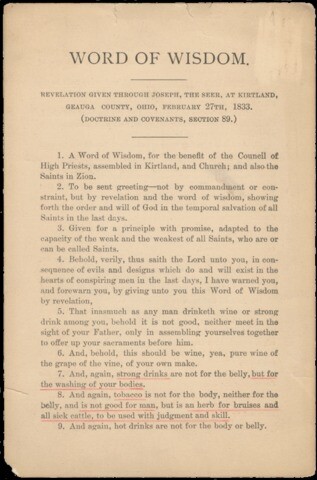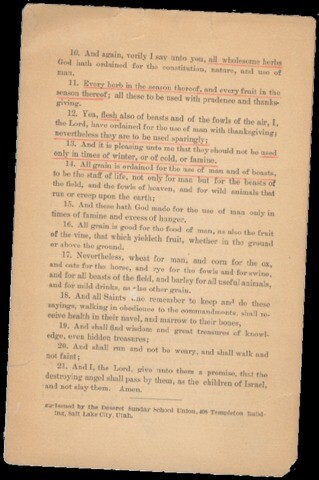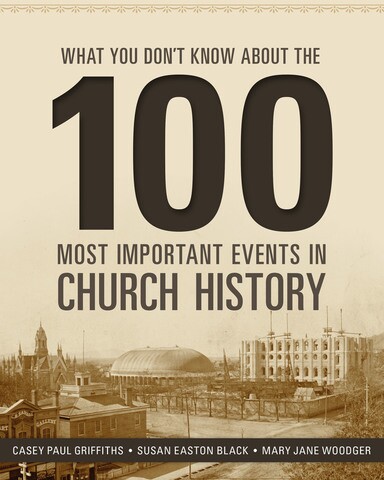Whether you’re a history buff or simply curious, you have probably collected a decent store of knowledge about important events in Church history. But no matter how much you thought you knew, there are a surprising number of fascinating facts that you might have overlooked. Here is an interesting story about the Word of Wisdom and its effects on the early saints of the Church.
When Joseph Smith inquired of the Lord on February 27, 1833, he received a revelation today known as the Word of Wisdom. From the beginning, the interpretation and implementation of the Word of Wisdom was complex. The opening line in the revelation stated: “To be sent by greeting; not by commandment or constraint.”
That wording led to debates about whether the revelation was a commandment or a guideline. A number of other questions also arose, including the meaning of “hot drinks” (D&C 89:9).
The Word of Wisdom received less attention after the martyrdom of Joseph Smith in June 1844. During the exodus from Nauvoo in 1845, a list of suggested supplies for the westward journey was printed in the Nauvoo Neighbor. The list included one pound of tea and coffee and one gallon of alcohol per family.
► You may also like: Why the 3 Degrees of Glory Sparked So Much Controversy for Early Members
In Winter Quarters, however, Brigham Young tried to curb the use of alcohol. A sweep at Winter Quarters uncovered five barrels of moonshine in a single day.
After the Saints’ arrival in the Salt Lake Valley and the hardships of pioneering began to recede, Brigham Young made additional attempts to persuade Latter-day Saints to follow the Word of Wisdom. By 1860 President Young had ended his personal use of alcohol, tobacco, tea, and coffee, except for medicinal or sacramental purposes.

Photo of Word of Wisdom courtesy of L. Tom Perry Special Collections, Harold B. Lee Library, Brigham Young University.
Renewed efforts by Church Presidents John Taylor, Wilford Woodruff, and Lorenzo Snow moved the Latter-day Saints toward total abstinence from the harmful substances. By 1900 evidence suggests that most Church leaders were living the Word of Wisdom. A landmark event came in 1902 when President Joseph F. Smith instructed stake presidents to refuse a temple recommend to “flagrant violators” of the Word of Wisdom. For the first time, violation of the Word of Wisdom led to restrictions in Church privileges.
This trend continued under Heber J. Grant. President Grant was a fierce advocate of Prohibition and a strict interpreter of the Word of Wisdom. In 1921, observance of the Word of Wisdom became a requirement for admission to the temple. President Grant clearly taught the revelation as a commandment, not as a guideline or a suggestion.
By the 1940s and 1950s, the question was not if the Latter-day Saints would live the Word of Wisdom but how far they would go in their zeal to follow its precepts. In 1945 Elder Joseph F. Merrill preached a fiery sermon against excessive use of meat. Elder John A. Widtsoe and his wife, Leah, wrote a book on the principles of the Word and Wisdom and gave as their opinion, “The expectant mother who uses caffeine-containing beverages is laying the foundation for failure in life for the unborn child.”
► You may also like: Why a Prophet Was Forced into Hiding (+ How He Managed to Still Lead the Church)
Other Church leaders advocated a more measured approach. When a theater employee apologized for giving President David O. McKay a cup with the Coca-Cola logo on the outside, the prophet quipped, “I don’t care what it says on the cup, as long as there is a Coke in the cup.” While individual interpretations have varied since the days of Presidents Heber J. Grant and David O. McKay, most faithful Latter-day Saints settle on the common ground of abstaining from alcohol, tobacco, coffee, tea, and harmful drugs.
Why was there such a gradual approach to accepting the Word of Wisdom as a commandment? President Joseph F. Smith offered the following opinion: “The reason undoubtedly why the Word of Wisdom was given—as not by ‘commandment or constraint’ was that at that time, at least, if it had been given as a commandment it would have brought every man, addicted to the use of these noxious things, under condemnation; so the Lord was merciful and gave them a chance to overcome, before He brought them under the law.”
Lead photo from Getty Images
For additional unique insights into well-known and little-known events in Church history, check out What You Don’t Know About the 100 Most Important Events in Church History, available at Deseret Book stores and on deseretbook.com.
Find this and other great stories like "The Write Stuff" and "Reunited After 62 Years" in the March/April 2017 issue of LDS Living.




